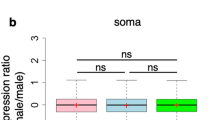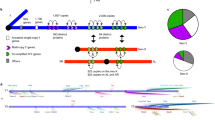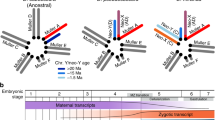Abstract
IN species where males and females differ in number of sex chromosomes, the expression of sex-linked genes is equalized by a process known as dosage compensation. In Drosophila melanogaster, dosage compensation is mediated by the binding of the products of the male-specific lethal (msl) genes to the single male X chromosome. Here we report that the sex- and chromosome-specific binding of three of the msl proteins (MSLs) occurs in other drosophilid species, spanning four genera. Moreover, we show that MSL binding correlates with the evolution of the sex chromosomes: in species that have acquired a second X chromosome arm because of an X-autosome translocation, we observe binding of the MSLs to the 'new' (previously autosomal) arm of the X chromosome, only when its homologue has degenerated. Moreover, in Drosophila miranda, a Y-autosome translocation has produced a new X chromosome (called neo-X), only some regions of which are dosage compensated. In this neo-X chromosome, the pattern of MSL binding correlates with the known pattern of dosage compensation.
This is a preview of subscription content, access via your institution
Access options
Subscribe to this journal
Receive 51 print issues and online access
$199.00 per year
only $3.90 per issue
Buy this article
- Purchase on Springer Link
- Instant access to full article PDF
Prices may be subject to local taxes which are calculated during checkout
Similar content being viewed by others
References
Charlesworth, B. Science 251, 1030–1033 (1991).
Charlesworth, B. Curr. Biol. 6, 149–162 (1996).
Bull, J. J. Evolution of Sex Determining Mechanisms (Benjamin/Cummings, 1983).
Baker, B. S., Gorman, M. & Marín, I. Annu. Rev. Genet. 28, 491–521 (1994).
Bashaw, G. J. & Baker, B. S. Development 121, 3245–3258 (1995).
Zhou, S. et al. EMBO J. 14, 2884–2895 (1996).
Kelley, R. L. et al. Cell 81, 867–877 (1995).
Grimaldi, D. A. Bull. Am. Mus. Nat. His. 197, 1–139 (1990).
Russo, C. A. M., Takezaki, N. & Nei, M. Mol. Biol. Evol. 12, 391–404 (1995).
Beverley, S. M. & Wilson, A. C. J. Mol. Evol. 21, 1–13 (1984).
Kwiatowski, J., Skarecky, D., Bailey, K. & Ayala, F. J. J. Mol. Evol. 38, 443–454 (1994).
Abraham, I. & Lucchesi, J. C. Genetics 78, 119–126 (1974).
Strobel, E., Pelling, C. & Arnheim, N. Proc. Natl Acad. Sci. USA 75, 931–935 (1978).
Das, M., Mutsuddi, D., Duttagupta, A. K. & Mukherjee, A. S. Chromosoma 87, 373–388 (1982).
Gorman, M., Franke, A. & Baker, B. S. Development 121, 463–475 (1995).
Dobzhansky, T. Genetics 20, 377–391 (1935).
Steinemann, M., Steinemann, S. & Turner, B. M. Chromosome Res. 4, 185–190 (1996).
Author information
Authors and Affiliations
Rights and permissions
About this article
Cite this article
Marín, I., Franke, A., Bashaw, G. et al. The dosage compensation system of Drosophila is co-opted by newly evolved X chromosomes. Nature 383, 160–163 (1996). https://doi.org/10.1038/383160a0
Received:
Accepted:
Issue Date:
DOI: https://doi.org/10.1038/383160a0
This article is cited by
-
Transcriptional effects of gene dose reduction
Biology of Sex Differences (2014)
-
Y-chromosome evolution: emerging insights into processes of Y-chromosome degeneration
Nature Reviews Genetics (2013)
-
Deciphering neo-sex and B chromosome evolution by the draft genome of Drosophila albomicans
BMC Genomics (2012)
-
Buffering and the evolution of chromosome-wide gene regulation
Chromosoma (2011)
-
A sequence motif enriched in regions bound by the Drosophila dosage compensation complex
BMC Genomics (2010)
Comments
By submitting a comment you agree to abide by our Terms and Community Guidelines. If you find something abusive or that does not comply with our terms or guidelines please flag it as inappropriate.



